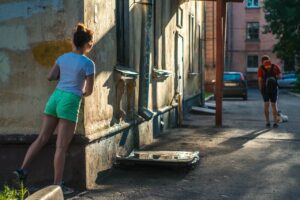1 Samuel 16: 1b, 6-7, 10-13a (RM) or 1-13 (RCL); Psalm 23; Ephesians 5: 8-14; John 9: 1-41
“What did I do to deserve this? What was God thinking? Is there even a God? Tell me why this happened!”
When I was teaching students for professional ministry at the M. Div. or M.A. level I used to tell them that sooner or later they’d be confronted with a person in deep distress – perhaps a terrifying diagnosis for them or for their loved one, or an accident or tragedy. I had to help students get comfortable with the idea that there is no quickie answer as to “Why?” A compassionate pastoral minister can listen attentively and supportively, pray with this person, be willing to journey with them through their grief and fear, and try to organize support from the local community to accompany the person in the long term. Ultimately the mystery of suffering and limitation just stands stubbornly before us and doesn’t back down. There is no effective, persuasive “Why.”
We can read this week’s Gospel story, on Jesus giving sight to the man born blind, on this level, and get some perspective on the reactions of those who witnessed the event – Jesus’ own disciples, the local religious authorities, the man’s parents. But, like last week’s story of Jesus’ encounter with the Samaritan woman at the well, and next week’s story on the raising of Lazarus, there’s much more here.
Fasten your life vest and grab an oar. We’re about to launch out into the murky waters of symbolism in the Gospel of John – and what’s really happening under the choppy surface of this lengthy story.
Anglican commentator Reginald H. Fuller summarizes this passage as follows: the original story concerned a man born blind whom Jesus healed. The account was expanded later to include a trial scene in several parts that reflected the crisis of Jewish converts to Christianity in the Johannine community at the end of the first century—they were under threat of expulsion from the synagogue. Then the author added elements pointing symbolically to Christ as “the light shining in the darkness,” and this creation of sight as a sign of that light. On top of that, the washing in the pool of Siloam represented baptism, which in the Johannine community was called photismos, illumination or enlightenment. It all fits.
In effect the story serves as instructions on how to react when you’re confronted by hostile religious authorities and threatened with, um, excommunication. This helps explain the now-sighted man’s simple explanation of what happened and his refusal to be entrapped into declaring too much about Jesus. His parents too, took a step back and avoided incriminating themselves by referring the authorities back to the man himself. The man shows a delicious sense of irony by deflecting their pressure, saying, “Do you want to be his disciples too?” How cheeky. In their consternation, the authorities drove him out anyway. Jesus went and sought him out. Face to face with Jesus, the man was free to give thanks and to believe.
The price of remaining in good standing with your local synagogue community was to refuse to acknowledge Jesus or his adherents. The crisis was splitting the Johannine community, probably right through families, as we read in the words of Jesus recorded in the other canonical gospels. And yet, there are ways not to be victims. The bullies do not always win.
There’s another aspect of the story that sheds light on how we deal with disability today. In our time disability is no longer to be seen as a sickness to be overcome – the dignity of the person takes priority. In this story, the man did not ask for healing. Jesus noticed his situation, and Jesus took the initiative. Jesus created the gift of sight in one who had never seen, using the ground of the earth, the dust from which all creation emerged. Jesus did not ask but instructed the man to go and wash off the mud. In turn the man himself does not fall into the trap of being a victim of the local religious governing powers, but cleverly thwarts the authorities’ invasive questioning (as did his parents.)
If we live with painful mysteries, we also live with new creation and resurrection.
Oh – and never let the bullies win.
© Susan K. Roll
Susan Roll retired from the Faculty of Theology at Saint Paul University, Ottawa, in 2018, where she served as Director of the Sophia Research Centre. Her research and publications are centred in the fields of liturgy, sacraments, and feminist theology. She holds a Ph.D. from the Catholic University of Leuven (Louvain), Belgium, and has been involved with international academic societies in liturgy and theology, as well as university chaplaincy, Indigenous ministry and church reform projects.





Thanks Susan, for another encouraging reflection. Your line “Fasten your life vest and grab an oar” seems apropos to many life situations!.